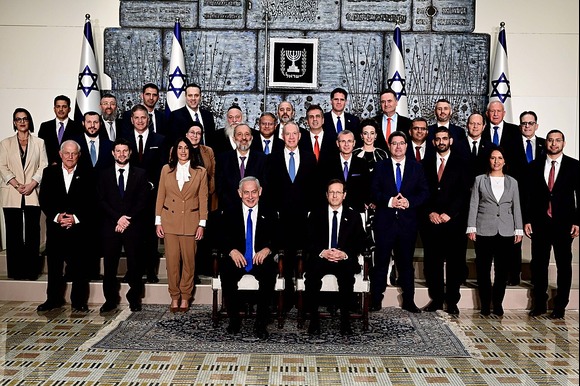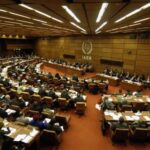Five nations Australia, Canada, New Zealand, Norway, and the United Kingdom have jointly announced sanctions against two far-right Israeli ministers, Itamar Ben-Gvir and Bezalel Smotrich, citing their incitement of violence against Palestinians in the occupied West Bank and Gaza. The foreign ministers of these countries issued a joint statement on Tuesday, formally condemning the ministers’ actions and confirming the imposition of asset freezes and travel bans.
Ben-Gvir, Israel’s National Security Minister, has previously been convicted in Israeli courts for incitement to racism and for supporting what was classified as a “terror” organisation. He, along with Finance Minister Smotrich—both residents of illegal Israeli settlements in the West Bank—has been a vocal advocate for the expansion of these settlements, the annexation of Palestinian territory, and the expulsion of Palestinians from their land. Both men are key figures in Prime Minister Benjamin Netanyahu’s far-right government.
The five-nation statement declared: “Ben-Gvir and Smotrich have incited extremist violence and serious abuses of Palestinian human rights. This is why we have taken action now to hold those responsible to account.”
Australian Prime Minister Anthony Albanese emphasized that while Australia continues diplomatic engagement with Israel, the country must “uphold its obligations under international law.” He added, “Some of the expansionist rhetoric that we’ve seen as well is clearly in contradiction of that from these hardline right-wing members of the Netanyahu government.”
However, the U.S. Department of State criticized the sanctions. Spokesperson Tammy Bruce called the move “extremely unhelpful,” adding, “We remain concerned about any step that would further isolate Israel from the international community.”
When asked about the predictable backlash from Israel and the U.S., Albanese reiterated that Australia has held a “consistent position” regarding the humanitarian crisis in Gaza.
In Israel, the response to the sanctions was swift. Foreign Minister Gideon Saar condemned the sanctions as “outrageous” and announced that a special cabinet meeting would be convened next week to formulate a response to what he called an “unacceptable decision.”
Smotrich, while inaugurating a new illegal Jewish settlement in Hebron, dismissed the UK’s involvement with disdain. “Britain has already tried once to prevent us from settling the cradle of our homeland, and we cannot do it again. We are determined, God willing, to continue building,” he said, referencing British rule during the Mandate period before Israel’s founding in 1948.
Both Ben-Gvir and Smotrich have repeatedly called for the permanent conquest of Gaza and the reestablishment of Jewish settlements there, despite Israel having withdrawn from Gaza in 2005.
Meanwhile, the leaders of the UK, France, and Canada have warned of further “concrete actions” against Israel should it continue its military operations in Gaza and maintain stringent restrictions on humanitarian aid. They reaffirmed their commitment to a two-state solution and urged restraint.
Israeli Prime Minister Netanyahu responded defiantly, accusing those governments of siding with Hamas and being “on the wrong side of history.”
Since the launch of Israel’s military campaign in Gaza in October 2023, more than 55,000 Palestinians—primarily women and children—have been killed, according to the Gaza Ministry of Health. Israel continues to enforce a debilitating siege and strict blockade on humanitarian aid to the devastated enclave.
The U.S.- and Israeli-backed Gaza Humanitarian Foundation (GHF), introduced as a new aid distribution model on May 27, has come under fierce criticism. Human rights groups claim it weaponizes aid, violates core humanitarian principles, and fails to meet urgent needs. Since the GHF’s operations began, Israeli forces have reportedly killed at least 130 Palestinians and injured more than 1,000 people during aid distribution incidents, where desperate families seeking food were fired upon.
In the occupied West Bank, Israeli military operations have also intensified. Raids across Palestinian towns and villages have escalated in recent months. On Tuesday, Israeli forces launched a prolonged raid on the city of Nablus, using live ammunition and tear gas, injuring at least 60 people and detaining many more. Residents are reportedly trapped in their homes without access to medical or essential services.
Local journalist Odeh reported that even paramedics are struggling to reach those in need. “They cannot leave their homes, they cannot have access to any services, and even paramedics are telling us they are having a very difficult time reaching those who need their assistance,” Odeh said. Bakeries, public offices, and schools have shut down as a result of the ongoing military presence.
“This is part of a series of military assaults that the Israeli army has been conducting against cities and refugee camps across the West Bank,” Odeh added, painting a bleak picture of the deteriorating conditions on the ground.






